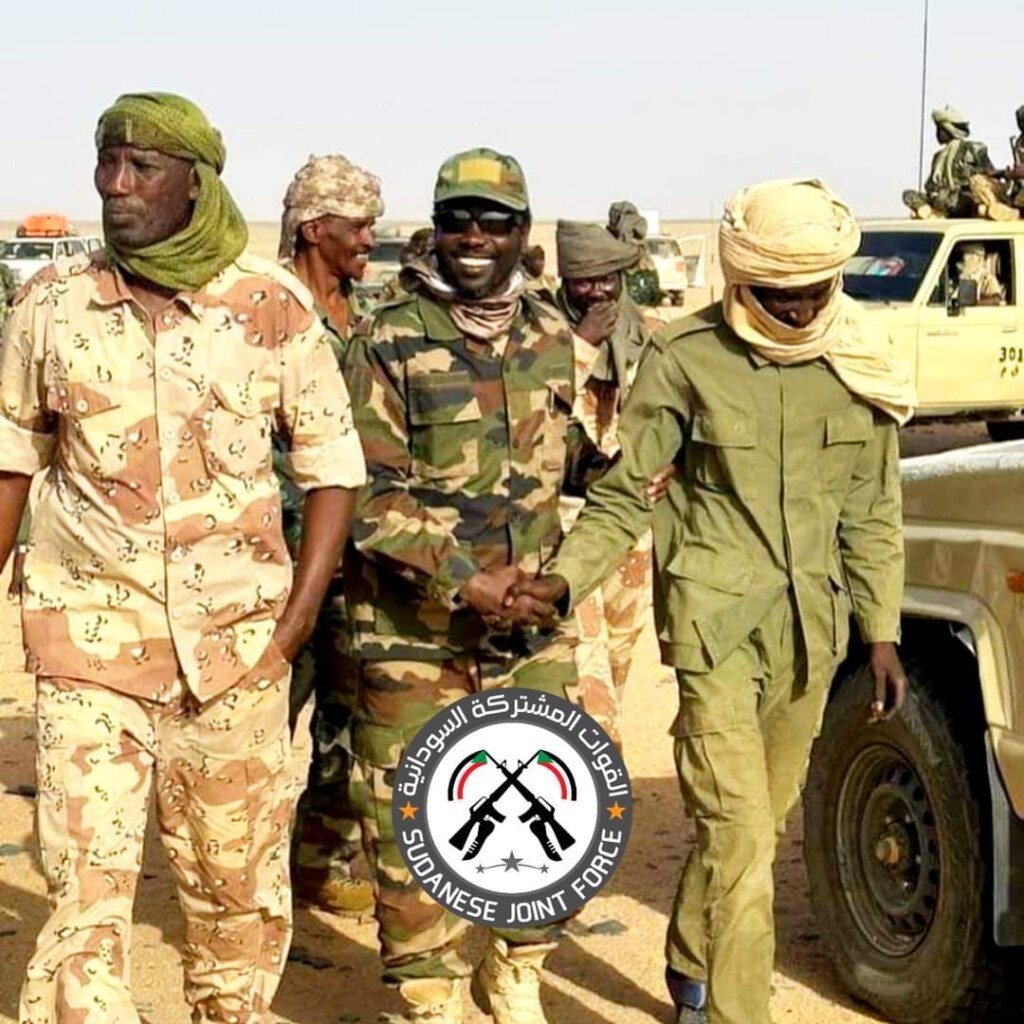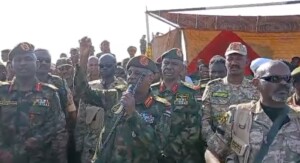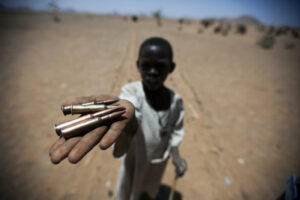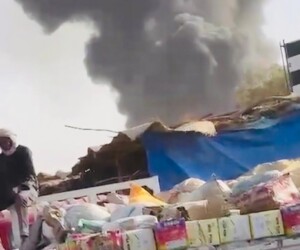North Darfur: Joint Force seizes ‘strategic areas’, Zaghawa and Arab leaders sign accord

Members of the Sudanese Joint Forces in Bir Mazza, North Darfur , October 2 (File photo: Sudanese Joint Forces via X)
Fierce fighting was reported from El Fasher, the capital of North Darfur, yesterday morning. The Darfur Joint Force seized the area north of Kutum in North Darfur that is reportedly of ‘strategic importance’ for the Rapid Support Forces (RSF). On Tuesday, the Joint Force took control of the Ed Debba-Mellit road. Zaghawa and Arab tribes signed a reconciliation agreement.
El Fasher witnessed violent battles between the Rapid Support Forces (RSF) and the army supported by the Darfur Joint Force of Armed Struggle Movements (also called the Sudanese Joint Force*) and armed civilian groups in the eastern and southeastern neighbourhoods in the past few days.
The El Fasher Resistance Committees said on their Facebook page yesterday that the RSF attacked these neighbourhoods at around 07:00 that morning, targeting homes, markets, hospitals, and mosques.
Kutum
Maj Ahmed Hussein, political affairs secretary of the Justice and Equality Movement (JEM) and spokesperson for the Joint Force reported in a press statement yesterday that the force “destroyed all RSF defences)” around the Bir Mazza base, 28 kilometres north of Kutum, after hours of fighting in the early morning. The paramilitaries fled to Damrat Ghereir, on the outskirts of Kutum town.
Minni Minawi, head of a Sudan Liberation Movement faction and governor of Darfur, said in statements on X and Facebook that the force destroyed all the RSF defences around the Bir Mazza base after hours of fighting. The rebel force also took control of Wadi El Maghreb, north of Kutum.
An RSF military source, however, told Radio Dabanga that their forces withdrew after members of a large Joint Force unit attacked the area.
The RSF took control of Kutum, 120 kilometres northwest of El Fasher, in early June.
Sources told Radio Dabanga from Kutum on Monday that the Sudanese Air Force bombed Kutum town that morning. The town’s weekly market and three neighbourhoods were damaged. No RSF site was hit.
Sudanese Joint Force
The Sudanese Joint Force is made up of fighters of the Sudan Liberation Movement faction headed by Darfur Governor Minni Minawi (SLM-MM), the JEM faction led by Finance Minister Jibril Ibrahim (JEM-JI), and several small rebel groups. These movements formed the Darfur Joint Force in June 2022 as agreed in the 2020 Juba Peace Agreement, to protect the people of Darfur. They renounced their neutrality in November last year and are now fighting against the RSF alongside the Sudanese Armed Forces (SAF).
In February this year, the Darfur Joint Force stopped securing aid convoys from Port Sudan to El Fasher, due to the violence on the roads.
Radio Dabanga reported yesterday that the SLM under the leadership of Abdelwahid Mohamed Nur (SLM-AW) and the Sudan Liberation Forces (SLF) alliance yesterday agreed on the formation of a neutral military alliance to protect civilians and humanitarian and commercial convoys in Darfur.
Strategic importance
Maj Ahmed Hussein said the Sudanese Joint Force considers the control of the RSF base in Bir Mazza “a major strategic achievement” as it is “one of the most important fortification centres for the RSF in the north, for delivering weapons and fuel smuggled from the country’s northwestern borders.
“In addition, the base served as a gathering point for mercenaries from neighbouring countries to train them and send them to various parts of Sudan.”
He added that “this base was a source of annoyance and a heavy burden on the people living north of Kutum” and accused the paramilitaries of the RSF of “all kinds of serious violations, including liquidations, plundering, kidnapping, and other brutalities” in Bir Mazza.
The RSF military source, however, downplayed the importance of the area and said that a limited RSF unit was stationed in the small area located between El Zurug and Ghereir.
People in Kutum town told Radio Dabanga that the RSF closed the market yesterday morning. They said that the closure of the market was related to the clashes in Bir Mazza, and fear that the Joint Force will reach Kutum in the coming days.
Ed-Debba-Mellit road
On Tuesday, the Sudanese Joint Force said that it had managed to seize control of the road connecting Ed Debba in Sudan’s Northern State with Mellit in North Darfur, after battles that lasted for 12 hours.
Spokesperson Hussein reported that the battles began in the Madu area, the moved to Wadi Sendi and the Sayah area, which is 30 kilometers from Mellit town.
JEM faction head Gibril Ibrahim confirmed on X that the Joint Force unit that came from the north won the battle of the Madu.
The Ed Debba-Mellit road is considered one of the alternative routes to El Fasher through the desert, passing through North Kordofan and a number of areas in North Darfur. It is 1,200 kilometers long and if the Joint Force controls it, it can protect the delivery of supplies from northern Sudan, controlled by the army, to North Darfur.
Plan
The spokesperson for the Joint Force of Armed Struggle Movements/Sudanese Joint Force explained that its leadership “designed a precise plan to cut off the supply lines and paths of the RSF”.
The Joint Force “seized control of the Sudanese-Libyan-Chadian border triangle three months ago as a first step, after which RSF bases and main strongholds in the desert axis of Wadi Howar, Wadi Ambar and Bir Margi were destroyed,” he said. “The joint force were able to take control of the Bir Mazza base today [Tuesday]”.
The RSF reported on Tuesday that they had been able to repel an attempt by a large unit of the Joint Force to reach El Fasher. In a statement on X the paramilitary group announced that they clashed with fighters of the Joint Force near El Malha town, north of Mellit, that day and “inflicted heavy losses in lives and equipment”. About 450 people were killed, and more than 137 vehicles were seized with their full equipment, the statement said.
Zaghawa-Arabs
Sudan War Monitor reported yesterday that the fighting in Bir Mazza coincided with the arrival of Joint Force reinforcements in the area, following mass mobilisation in North Darfur, neighbouring Chad, and eastern parts of Sudan. “Many of the Joint Force fighters are ethnic Zaghawa, whereas the RSF are mostly Arab, so that the fighting is largely along ethnic lines.”
Residents of El Fasher, the last of the five Darfur state capitals not under RSF control, fear that full RSF control of the city could ignite strife between the Arab tribes supporting the RSF and the Zaghawa tribe, from which most fighters of the North Darfur rebel movements hail. Zaghawa leaders have allegedly contacted Chadian President Mahamet Deby, also a Zaghawa, asking him to intervene to prevent a “catastrophic bloodbath” in the area.
On Tuesday, leaders of Arab tribes and the Zaghawa tribe in North Darfur signed a reconciliation accord following violent clashes between the two sides on July 27 in the Wadi Abu Taleh area, west of the Ain Siro Mountains and southwest of the Abu Lahi area. The violence, sparked by mutual thefts, left 16 people dead.
The agreement came as a result of an initiative put forward by the head of the Revolutionary Awakening Council (RAC) and former janjaweed commander Musa Hilal, immediately after the clashes, through which he was able to obtain pledges from both parties to cease hostilities and to hold a reconciliation conference in the last week of September.
RAC Spokesperson Ahmed Abakar reported that Omda El Tijani Bereima, signed on behalf of the Arab tribes, and Omda Jaafar Karama signed on behalf of the Zaghawa. The terms of the agreement stipulated the payment of blood money and the return of the stolen property.
* The Darfur Joint Force was formed in June 2022, as agreed on in the 2020 Juba Peace Agreement (JPA), to protect the people in the region. The force was made up of fighters of the Sudan Liberation Movement faction headed by Darfur Governor Minni Minawi (SLM-MM), the JEM faction led by Finance Minister Gibril Ibrahim (JEM-GI), and several small rebel groups that signed the JPA. These movements renounced their neutrality in November last year and are now fighting the RSF alongside the Sudanese army. Since then, Sudanese media speak about the Joint Force of Armed Struggle Movements, while the group’s logo on their X and Facebook accounts says Sudanese Joint Force (and in Arabic Sudanese Joint Forces).











 and then
and then